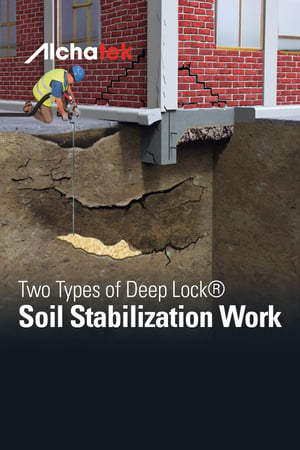
 Deep Lock® is an innovative process developed by Alchatek that utilizes high-quality structural polymers to address deep soil issues. This powerful, painless, and rapid solution stabilizes soil at all levels, ensuring long-lasting results with minimal disruption to the property. This article profiles the two main types of Deep Lock® soil stabilization work and the specific situations in which each type is most effective.
Deep Lock® is an innovative process developed by Alchatek that utilizes high-quality structural polymers to address deep soil issues. This powerful, painless, and rapid solution stabilizes soil at all levels, ensuring long-lasting results with minimal disruption to the property. This article profiles the two main types of Deep Lock® soil stabilization work and the specific situations in which each type is most effective.
Jobs Requiring One Component Grouts (AP Fill 700 and AP Fill 720)
One-component grouts, such as AP Fill 700 and AP Fill 720, are used for permeation grouting. Permeation grouting involves injecting a low-viscosity grout to saturate loose soil and, upon curing, create a solid, stable mass. This type of Deep Lock® work is ideal for the following situations:
- Loose Soil: When dealing with loose, unstable soil, permeation grouting can effectively bind the soil particles together, creating a stronger foundation.
- Curtain Walls: One component grouts are often used to create subsurface barriers, or curtain walls, to prevent water infiltration or contain contaminants.
- Zero-Point Excavation: In cases where excavation is not feasible or desirable, permeation grouting can be used to stabilize the soil without disturbing the surface.
Jobs Requiring Two Component Structural Polymers (AP Lift 430, AP Lift 440, and AP Lift 475)
Two-component structural polymers, like AP Lift 430, AP Lift 440, and AP Lift 475, are used for compaction grouting. Compaction grouting involves injecting a highly viscous grout under pressure to compact and displace the surrounding soil. This type of Deep Lock® work is best suited for the following situations:
- Hard Clay Soils: Two-component structural polymers are effective in densifying and strengthening hard clay soils, which can be challenging to treat with other methods.
- Non-Sand/Silt Mix: When the soil composition is not primarily sand or silt, compaction grouting with two component polymers is often the most effective solution.
- Lifting Involved: If lifting of the structure or surface is desired, two component structural polymers are the ideal choice. These polymers expand after injection, providing controlled lifting force.
Two-component structural polymers offer more versatility than one-component grouts, as they can address a wider range of soil types and provide the added benefit of controlled lifting.
A Versatile Process for Soil Stabilization Work
The Deep Lock® process, with its range of high-quality structural polymers, provides a powerful and efficient solution for addressing deep soil issues. By understanding the specific characteristics of one-component grouts and two-component structural polymers, contractors can select the most appropriate approach for each unique situation. Whether dealing with loose soil, hard clay, or the need for controlled lifting, Deep Lock® has the tools and expertise to deliver rapid, long-lasting results with minimal disruption to the property. Alchatek's soil stabilization polymers are NSF-certified for contact with potable water. This means they meet the EPA's strict environmental standards as defined in the Safe Drinking Water Act (SDWA).
Fill out this form or call 404-618-0438 for assistance today!
Want more information on the Deep Lock® process?


